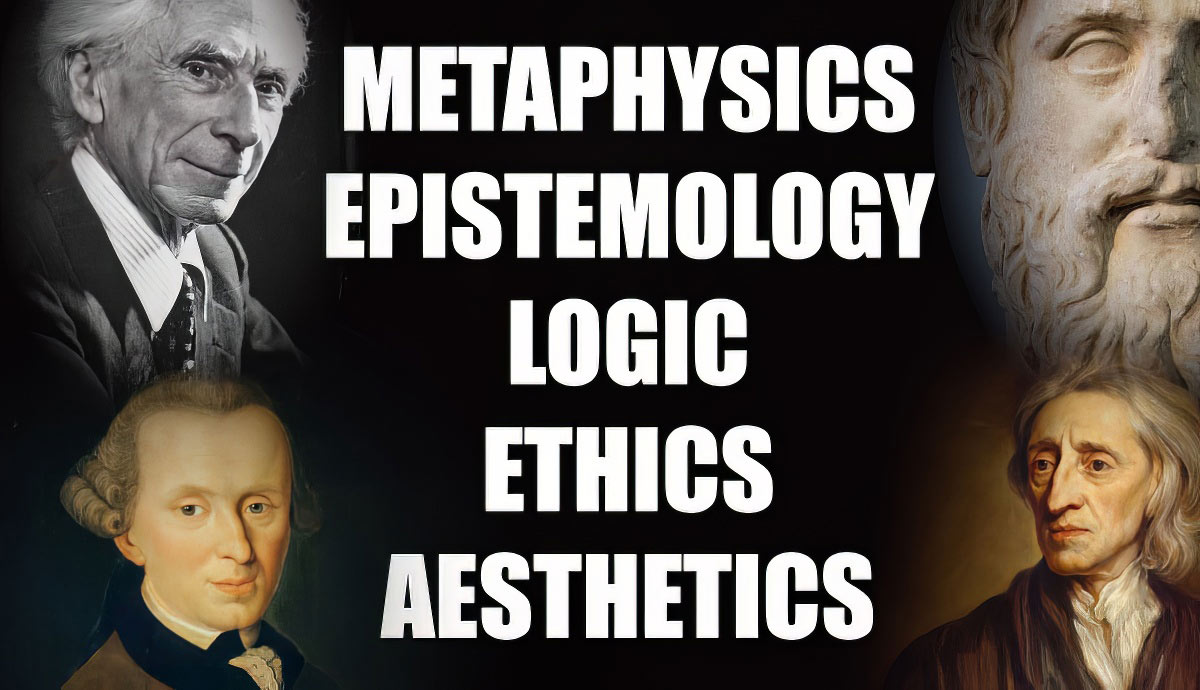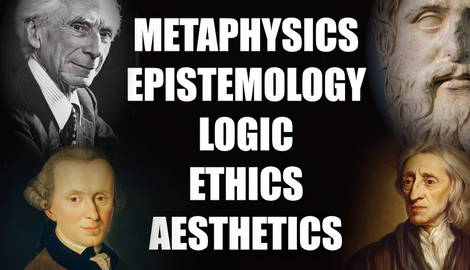
Out of all the sciences, philosophy is the most undefined. We can reach an agreement that every special science is defined by its subject of investigation and its methods of examination. However, that’s not the case with philosophy. Although there is no consensus about the definition of philosophy, the branches of philosophy do have a definition, and examining them can help explain what philosophy really is. This article explores the five major branches and shows how they contribute to our understanding of philosophy as its own field of study, separated from the sciences.
1. Examining the Universe: Metaphysics

One of the first questions ever posed, not just in the field of philosophy but also in science in general, is the question about Being, the question about the first principle, the root cause of all existence. The discipline that deals with the question of Being is metaphysics or ontology. We can define metaphysics as the study of the existent as existent, or as the study of Being.
The term metaphysics derives from Ta meta ta phusika, meaning “the ones after the physical ones,” an expression coined by an ancient editor (probably Andronicus of Rhodes) of Aristotle’s works as a title for the books listed after the ones of physics (the study of the sensible and mutable objects).

Philosophers of the ancient cosmological period investigated the question of Being. The cosmological period is the period of forming ancient philosophy, and its focus was on uncovering the underlying nature of reality.
Roughly speaking, there are two schools of thought within metaphysics, each identifying Being in its own way. Materialism sees Being as made out of material components. For example, Thales thought that Being is water, Heraclitus believed that Being is fire, and so on.
On the other hand, idealism sees Being and the world as made out of something idealistic or spiritual. The famous philosopher and mathematician Pythagoras saw the number as the first underlying principle, while Plato thought that ideas were the first Beings because they are eternal. Material things, says Plato, can be destroyed and perish, but ideas cannot.

Another important distinction exists according to how many Beings fundamentally exist.
Monism states that Being can be only one principle and one basis of reality, which serves as the root cause of all existence. Heraclitus, for example, is a monist. He states that fire and nothing else can be considered the fundamental cause of the universe. Fire is the first and only principle from which everything else is created, and the last point of everything.
Dualism states that the universe is based on two primordial principles. René Descartes thought that two substances existed in the world: the mind and the body.
Lastly, pluralist philosophers see the world as containing many Beings. Plato was a pluralist-oriented thinker, as he thought there exists an infinite number of ideas. Another pluralist thinker is the ancient philosopher Democritus, who believed that Beings are atoms. As there are infinitely many atoms, there exists an infinite number of Beings.
Key Takeaways
- Metaphysics explores fundamental questions about reality.
- It delves into existence, being, and the nature of things.
2. Examining Knowledge: Epistemology

When faced with the question of what exists in the world, it’s almost inevitable to ask: how do philosophers know about Being? How did they get the knowledge of what exists in the world and what does not? How do we know what they’re saying is true?
This is the point where we go from metaphysics to the next branch of philosophy – epistemology. The term epistemology comes from the Greek epistēmē (knowledge) and logos (reason). Thus, it is usually referred to as the branch of philosophy studying the origin, nature, and limits of human knowledge.
Within epistemology, there are various approaches to what knowledge is and how it is acquired. Rationalism is a branch of epistemology that sees human reason, the “ratio,” as the source of all knowledge. Aristotle and Plato are rationalists, seeing the human mind as able to understand everything in the universe.

Empiricism, on the other hand, claims that all knowledge is acquired through experience, which is seen as the source of all human knowledge. John Locke and David Hume were empirically oriented thinkers, stating that people are born as a “tabula rasa” – a blank slate with no impressions on it. Thus, they believed that all the knowledge that we acquire throughout life is indeed gained through experience.

There’s also another approach to epistemology – irrationalism. Irrationalism sees the ultimate source of our knowledge as something irrational, and it comprises two different sub-categories: voluntarism (taking the will as being the only real source of knowledge) and intuitionism (taking intuition as the proper means of acquiring knowledge).
Epistemology also explores the limits of human cognition and knowledge. Here, there are three basic approaches: dogmatism, agnosticism, and skepticism.
Dogmatism sees human knowing abilities as perfect and argues that man can indeed know the world to the fullest. On the other hand, agnosticism claims that humans cannot really know the world, as they are severely limited in their cognitive abilities. Skepticism is the middle way between the two: it doubts the possibility of getting to know the world.
Key Takeaways
- Epistemology explores the nature and scope of knowledge.
- Knowledge originates from reason or experience.
3. Examining Reason: Logic

Another branch of philosophy that is closely linked to epistemology is logic. Logic is the study of correct reasoning. The term originates from the Greek word logos, meaning word, reason, thought, or science.
The ancient Greek philosopher Aristotle is widely considered the founder of Logic. He paid close attention to the way that we think, noticed the principles of our reasoning, and analyzed how we make conclusions. That’s why he named the book containing the logic corpus Organon, which means instrument, tool, or organ used for reasoning.
Logic includes both formal and informal logic. Formal logic investigates how conclusions follow from premises in a topic-neutral way. It’s a set of formal rules and principles within a system that determines the validity and truthfulness of an argument or conclusion. On the other hand, informal logic is associated with informal fallacies, critical thinking, and argumentation theory.
Logic is a complementary part of any given science, but it plays a central role mostly in philosophy, mathematics, computer science, and linguistics. However, whether logic can be considered a separate and distinct scientific discipline or is simply a skill remains an open question to this day.
Key Takeaways
- Logic is the study of correct reasoning.
- Logic is a tool for valid arguments and critical thinking.
4. Examining Morals: Ethics

Ethics is one of the most central disciplines of philosophy. It can be defined as moral philosophy, as it’s concerned with what is morally good and bad, or morally right and wrong. We can also define Ethics as the study of the righteous and virtuous way of living.
Many philosophers have shared their thoughts on how to live the best possible life. Aristotle believed that we should live our lives by the concept of the “golden mean,” the middle ground between two extremes, one of excess and the other of deficiency. For example, modesty is the golden mean between selfishness and extreme generosity.
Epicurus believed that the goal of ethics is to help men with their mental struggles. The goal of ethics is a happy human life. To do that, Epicurus says that we have to let go of all of our fears, so that we can lead a happy and purposeful life.

Ethics is a very valuable field of study not just in philosophy, but in science in general. It teaches man how to act and behave, and as such, helps him to become an autonomous human being.
There are three major areas of study within ethics:
- Meta-ethics: the study of the nature, scope, and meaning of moral statements.
- Normative ethics: the study of the practical means of determining a moral course of action. Normative ethics addresses questions such as “What should be done?”
- Applied ethics: its focus is on what a person is obligated (or permitted) to do in a certain specific, real-world situation.
5. Examining Beauty: Aesthetics

Aesthetics is another important branch of philosophy, and it can be defined as the study of beauty, taste, and art. It is also referred to as the study of the mind in relation to the sense of beauty.
It examines aesthetic values and deals with such notions as the beautiful, the ugly, and the sublime. It’s a way of establishing the meaning and validity of critical judgments concerning works of art.
Some philosophers thought that beauty is objective and universal and that there are specific standards a piece of art should possess in order to be considered beautiful. Other philosophers saw beauty as something subjective and relative, arguing that beauty is in the eye of the beholder.

Aesthetics also seeks to define what art really is. Can nature be considered art, or is it only artificial, i.e., man-made works of art? If it is only man-made, does that mean that every artifact made by man is art? What standards should a piece of art possess for it to be considered an artistic piece?
Regarding these questions, there are various approaches. Some (like Plato) say that it is the piece’s ability to imitate reality that makes it an artwork. For example, painting nature on canvas is a representation and imitation of reality. Thus, a painting of nature can indeed be considered an artwork. Others, however, emphasize the role of the artist and the power of art itself.
Key Takeaways
- Aesthetics studies the nature of beauty, taste, and art.
- Explores why we find certain things pleasing or artful.










